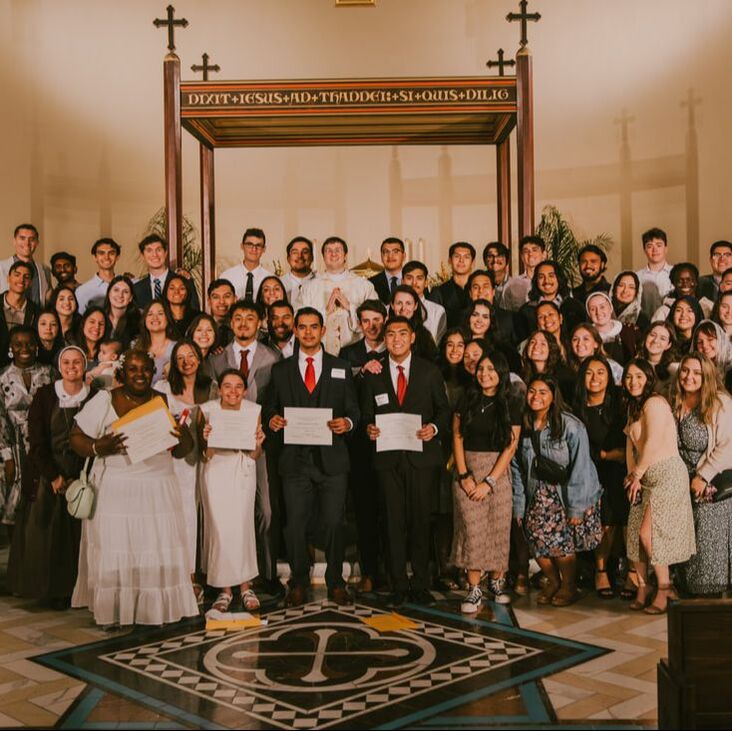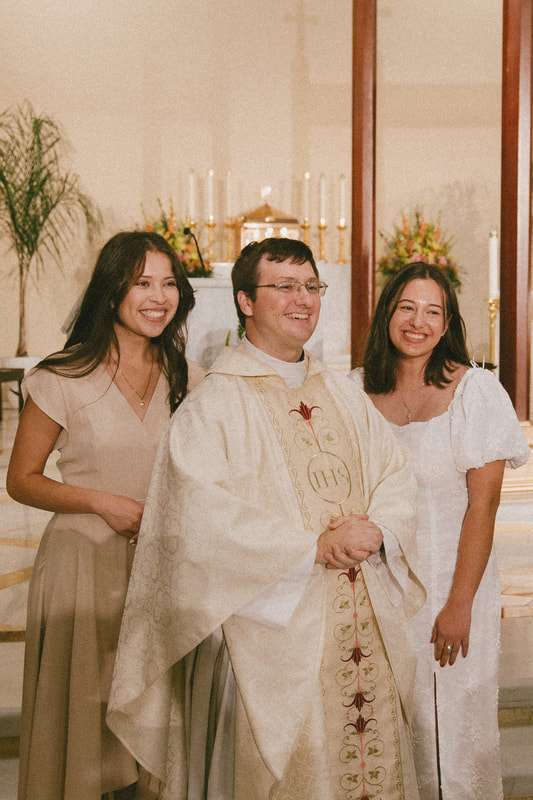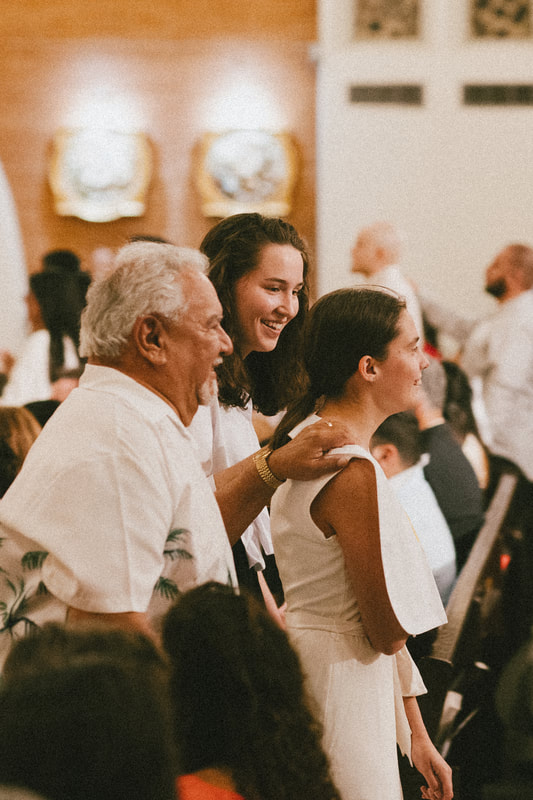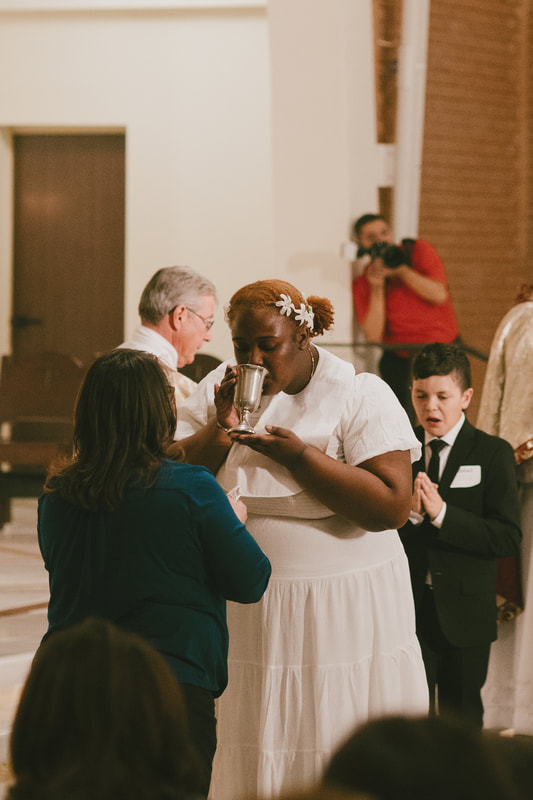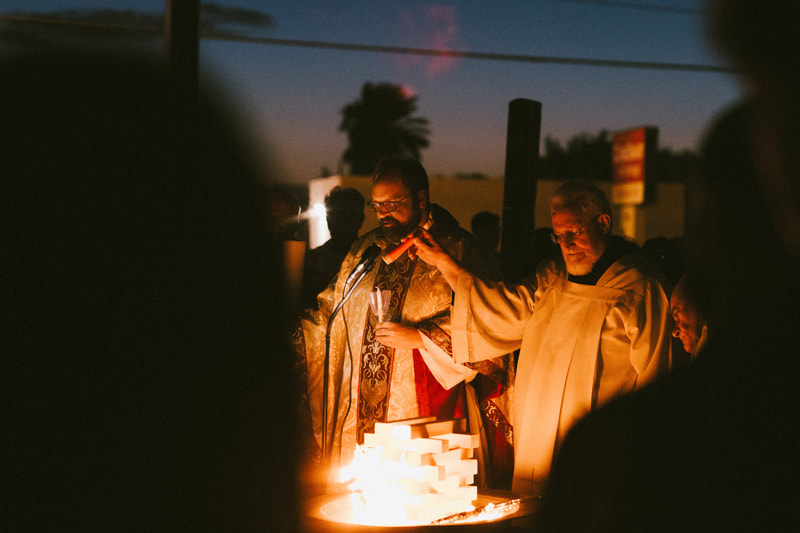Are you interested in becoming Catholic?
Are you Catholic, but in need of the Sacrament of First Communion, or Confirmation to complete your initiation?
|
OCIA classes offer the opportunity to discover or deepen your relationship with God through time in scripture, study, prayer and fellowship.
Classes begin in September and are held throughout the year leading up to the Easter Vigil & Reception of Sacraments. Please contact [email protected] for more information. From the time of the apostles, becoming a Christian has been accomplished by a journey and initiation in several stages. This journey can be covered rapidly or slowly, but certain essential elements will always have to be present: Proclamation of the Word, acceptance of the Gospel entailing conversion, profession of faith, Baptism itself, the outpouring of the Holy Spirit, and admission to Eucharistic Communion. (Catechism of the Catholic Church 1229) |
What are the steps of Christian Initiation?
Period of Evangelization and Precatechumenate
For some, this process involves a long period of searching; for others, a shorter time. Often, contact with people of faith and a personal faith experience lead people to inquire about the Catholic Church. After a conversation with a priest or a parish director of Christian Initiation, the person, known as an "inquirer," may seek acceptance into the Order of Catechumens, through the Rite of Acceptance. During this Rite, the inquirer stands amidst the parish community and states that he or she wants to become a baptized member of the Catholic Church. The parish assembly affirms this desire and the inquirer becomes a Catechumen.
Period of the Catechumenate
During this time, the Catechumens consider what God is saying to them in the Scriptures, what changes in their life they need to make to respond to God's inspiration, and what Baptism in the Catholic Church means. When a Catechumen and the priest and the parish team working with him or her believes the person is ready to make a faith commitment to Jesus in the Catholic Church, the next step is the request for baptism and the celebration of the Rite of Election. Even before the Catechumens are baptized, they have a special relationship to the Church.
The Rite of Election includes the enrollment of names of all the Catechumens seeking baptism at the coming Easter Vigil. Typically, on the first Sunday of Lent, the Catechumens, their sponsors and families gather at the cathedral church. The Catechumens publicly express their desire for baptism to the diocesan bishop. Their names are recorded in a book and they are called the Elect.
Period of Purification and Enlightenment
Lent is a period of preparation marked by prayer, study, and spiritual direction for the Elect, and prayers for them by the parish communities. The Celebration of the Sacraments of Initiation takes place during the Easter Vigil Liturgy on Holy Saturday when the Elect receives the sacraments of Baptism, Confirmation and Holy Eucharist. Now the person is fully initiated into the Catholic Church.
Period of the Post-Baptismal Catechesis (Mystagogy)
This period continues at least until Pentecost. During the period the newly baptized members reflect on their experiences at the Easter Vigil and continue to learn more about the Scriptures, the Sacraments, and the teachings of the Catholic Church. In addition they reflect on how they will serve Christ and help in the Church's mission and outreach activities.
(United States Conference of Catholic Bishops)
For some, this process involves a long period of searching; for others, a shorter time. Often, contact with people of faith and a personal faith experience lead people to inquire about the Catholic Church. After a conversation with a priest or a parish director of Christian Initiation, the person, known as an "inquirer," may seek acceptance into the Order of Catechumens, through the Rite of Acceptance. During this Rite, the inquirer stands amidst the parish community and states that he or she wants to become a baptized member of the Catholic Church. The parish assembly affirms this desire and the inquirer becomes a Catechumen.
Period of the Catechumenate
During this time, the Catechumens consider what God is saying to them in the Scriptures, what changes in their life they need to make to respond to God's inspiration, and what Baptism in the Catholic Church means. When a Catechumen and the priest and the parish team working with him or her believes the person is ready to make a faith commitment to Jesus in the Catholic Church, the next step is the request for baptism and the celebration of the Rite of Election. Even before the Catechumens are baptized, they have a special relationship to the Church.
The Rite of Election includes the enrollment of names of all the Catechumens seeking baptism at the coming Easter Vigil. Typically, on the first Sunday of Lent, the Catechumens, their sponsors and families gather at the cathedral church. The Catechumens publicly express their desire for baptism to the diocesan bishop. Their names are recorded in a book and they are called the Elect.
Period of Purification and Enlightenment
Lent is a period of preparation marked by prayer, study, and spiritual direction for the Elect, and prayers for them by the parish communities. The Celebration of the Sacraments of Initiation takes place during the Easter Vigil Liturgy on Holy Saturday when the Elect receives the sacraments of Baptism, Confirmation and Holy Eucharist. Now the person is fully initiated into the Catholic Church.
Period of the Post-Baptismal Catechesis (Mystagogy)
This period continues at least until Pentecost. During the period the newly baptized members reflect on their experiences at the Easter Vigil and continue to learn more about the Scriptures, the Sacraments, and the teachings of the Catholic Church. In addition they reflect on how they will serve Christ and help in the Church's mission and outreach activities.
(United States Conference of Catholic Bishops)
